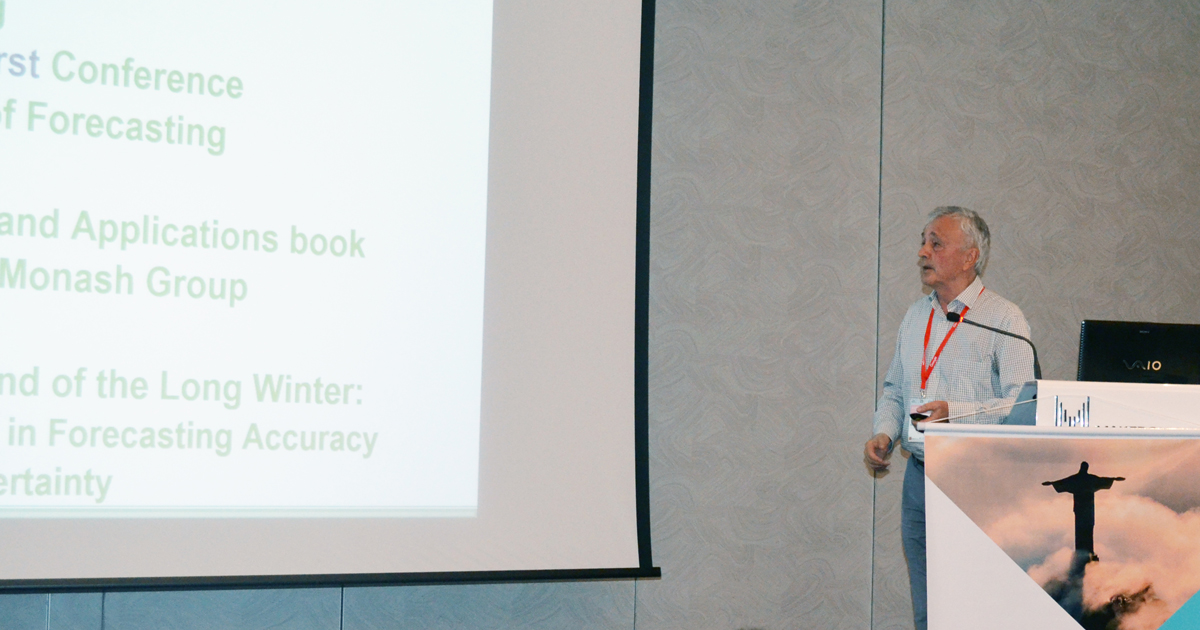International Symposium on Forecasting Explores M4 Competition Findings and their Applicability to Business
The 39th edition of the Symposium took place over four days in Thessaloniki, featuring IFF’s Professor Spyros Makridakis and the findings of his latest M-Competition
Professor Spyros Makridakis, Director of Research at the University of Nicosia’s Institute For the Future (IFF) and, for many, the father of Forecasting, headlined the 39th edition of the annual International Symposium on Forecasting (ISF) that he founded in 1981. Held this year between 16 and 19 June in Thessaloniki, Greece, ISF 2019 once again drew the world’s top forecasters and researchers, both as presenters and participants, to learn about and discuss cutting-edge developments in Forecasting with special emphasis on the findings of the M4 Competition.
As one of the Forecasting field’s premier international conferences, ISF showcases the breadth of forecasting sectors every year, featuring sessions on everything from climate predictability to financial-market volatility, to tourism forecasting, to information technology trends. According to George Athanasopoulos, the General Chair of ISF 2019: “The symposium provides a platform for leading forecasting professionals to reveal their insights into the field […] With a stimulating scientific and practitioner program [and] plenty of networking opportunities”.
Professor Makridakis’ presented the major findings of the M4 Forecasting Competition. The M4 (or Makridakis 4) is the latest edition of the premier academic forecasting competition in the world (co-organised in 2018 with the National Technical University of Athens), featuring hundreds of teams from 48 countries across the globe. The M4 served as a focal point in this year’s ISF proceedings, with the implications of its findings, as well as their practical applications re improving forecasting accuracy and correctly assessing future uncertainty elaborated upon and discussed at length during the Symposium in many of its sessions.
More generally, the revolutionary M-Competitions, which Professor Makridakis (whom the M-Competitions are also named after) launched four decades ago, have substantially contributed to improving forecasting accuracy as well as the estimation of uncertainty and informing practitioners on the most appropriate forecasting method to use for their specific needs.
Other notable speakers at this year’s ISF included: Tanya Garcia, Texas A&M University; Tilmann Gneiting, Karlsruhe Institute of Technology; Nigel Harvey, University College London; Gael Martin, Monash University; Ian McHale, University of Liverpool; and George Kapetanios, Kings College London. In addition to the stellar line-up of academic speakers, the 39th ISF also featured a “Forecasting in Practice” Track to meet the professional development needs of business-forecasting practitioners, with Forecasting professionals and industry experts weighing in on the aforementioned practical applications of the outcomes deriving largely from the M4.
The function and scope of contemporary M-Competitions are characteristic of a cross-disciplinary approach to research embraced by the Institute For the Future at UNIC, which itself was founded to explore the hypothesis that exponential technologies will cause societal change over the coming decades. The findings of the M4 Competition, together with papers describing the winning methods and related information are being published in a special issue of the International Journal of Forecasting (also founded by professor Makridakis in 1985).
The upcoming M5 will go further than previous competitions, to include explanatory and exogenous variables, as well as hierarchical, high-frequency, daily data for predictions for intermittent demand and the sales of firms such as supermarkets. Given the standing of M-Competitions in the Forecasting community, and their significant contributions throughout the years, fundamentally changing the field, the M5 – which is on track to launch in 2020 – is expected to be the largest global competition of its kind and an undeniable focal point for future international forecasting symposia to further advance the field.

